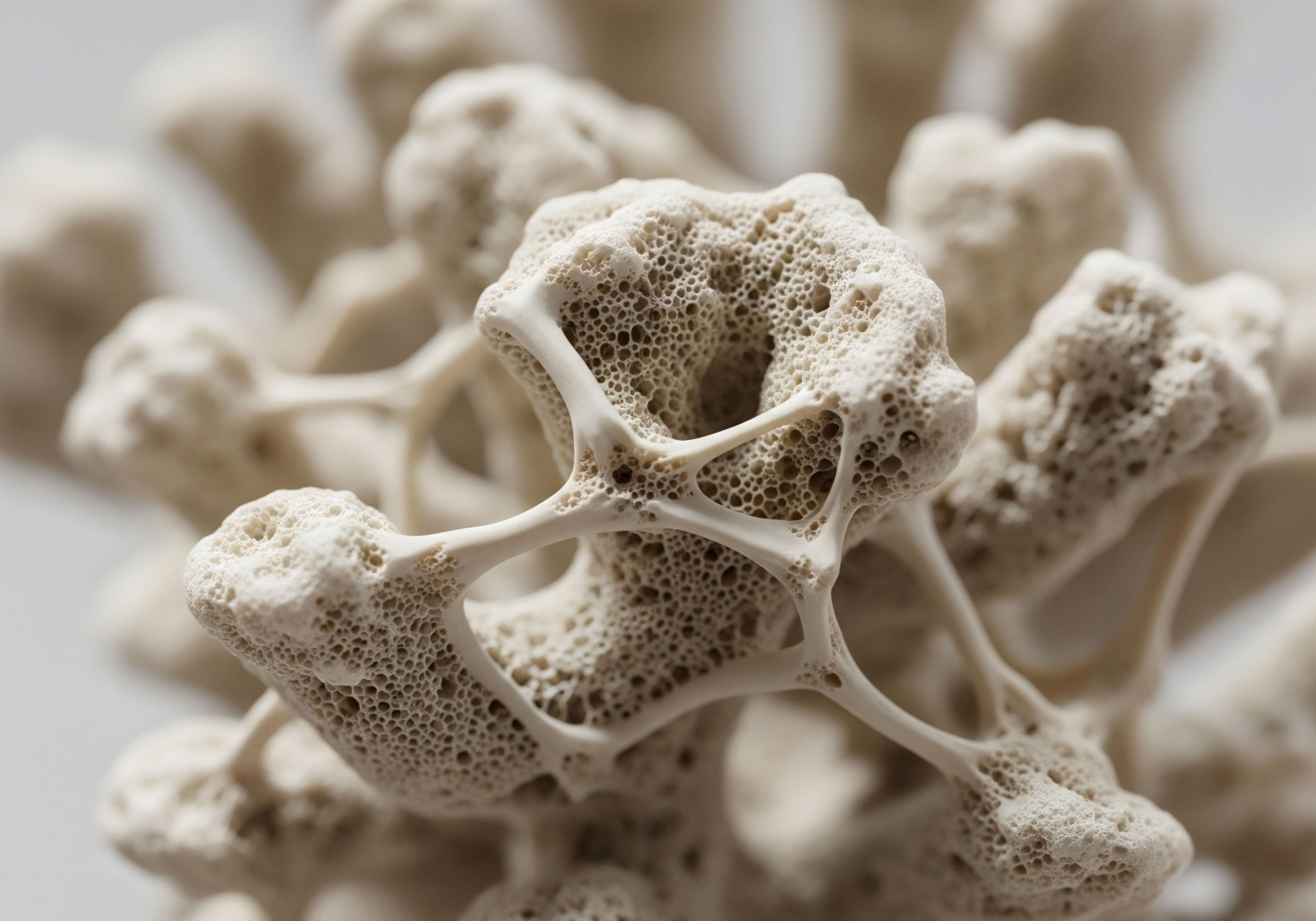

Fundamentals
You may feel that your body is betraying you. The fatigue, the mood swings, the unexplained weight changes, these are not just abstract symptoms; they are your lived reality. It is a common experience to feel that these hormonal struggles are an inescapable part of your family history, a script written into your DNA.
The truth is, your genetic makeup does play a role in your hormonal health. It can create predispositions, making you more susceptible to conditions like Polycystic Ovary Syndrome (PCOS) or thyroid issues. This genetic blueprint is a part of your story.
Your genes are not your destiny. They are more like a set of instructions, and your lifestyle choices have a profound impact on how those instructions are read. This is the core of epigenetics, the science of how your behaviors and environment can cause changes that affect the way your genes work.
Think of your genes as a complex switchboard. Your lifestyle choices, such as the food you eat, the quality of your sleep, and how you manage stress, are the hands that flip those switches on or off. A genetic tendency towards hormonal imbalance is just that, a tendency. It is not a life sentence.
Your genetic blueprint is a part of your story, but it is not the whole story.
The endocrine system, the intricate network of glands that produce hormones, is incredibly responsive to your daily habits. Hormones are chemical messengers that regulate everything from your metabolism to your mood. When you eat a nutritious meal, you are sending your body the raw materials it needs to produce these messengers correctly.
When you engage in regular physical activity, you are improving your body’s sensitivity to these hormonal signals. Conversely, chronic stress and poor sleep can disrupt this delicate communication system, leading to the very symptoms you may be experiencing.
The power to influence your hormonal health is already within your grasp. By understanding the interplay between your genes and your lifestyle, you can begin to make informed choices that support your body’s natural equilibrium. This journey is about reclaiming a sense of agency over your own biology. It is about recognizing that while you may have a genetic predisposition, you also have the ability to rewrite the narrative of your health, one intentional choice at a time.


Intermediate
To truly appreciate how lifestyle can rewrite aspects of our genetic predispositions, we must first understand the concept of gene expression. Your DNA sequence is fixed, but the degree to which a gene is “turned on” or “off” is a dynamic process. This is where lifestyle interventions become so powerful.
They directly influence the epigenetic markers that control gene expression, effectively changing the volume on your genetic predispositions. For example, a diet rich in anti-inflammatory foods can help to down-regulate genes that promote inflammation, a key driver of many hormonal disorders.
Let’s consider a specific example ∞ the MTHFR gene. This gene provides instructions for making an enzyme that is critical for processing folate (vitamin B9). A common variation in this gene can lead to a less efficient enzyme, which can impact a wide range of bodily functions, including hormone regulation.
An individual with this genetic variation might be more susceptible to hormonal imbalances. A targeted nutritional strategy that provides methylated forms of folate and B12 can directly support this compromised pathway, effectively bypassing the genetic bottleneck. This is a clear demonstration of how a specific lifestyle modification can compensate for a genetic inefficiency.
Lifestyle interventions can directly influence the epigenetic markers that control gene expression, effectively changing the volume on your genetic predispositions.
The Hypothalamic-Pituitary-Adrenal (HPA) axis is another critical area where lifestyle has a profound impact. This is your body’s central stress response system. Chronic stress, whether from emotional duress or physiological sources like poor diet and lack of sleep, leads to a sustained output of cortisol.
This can have a domino effect on your endocrine system, suppressing thyroid function, disrupting sex hormone balance, and promoting insulin resistance. Lifestyle interventions aimed at stress modulation, such as mindfulness, meditation, and adequate sleep, can help to recalibrate the HPA axis, restoring a more favorable hormonal environment.

The Role of Diet and Exercise
Diet and exercise are two of the most potent tools for influencing hormonal health. A diet high in processed foods, sugar, and unhealthy fats can promote inflammation and insulin resistance, both of which are major contributors to hormonal imbalances.
On the other hand, a diet rich in whole foods, including lean proteins, healthy fats, and fiber, provides the necessary building blocks for hormone production and helps to stabilize blood sugar levels. Regular exercise, particularly a combination of strength training and cardiovascular activity, has been shown to improve insulin sensitivity, reduce cortisol levels, and promote the release of endorphins, which have mood-boosting effects.
The following table illustrates how specific lifestyle interventions can target different aspects of hormonal health:
| Lifestyle Intervention | Mechanism of Action | Hormonal Impact |
|---|---|---|
| High-Fiber Diet | Binds to excess estrogen in the gut, promoting its excretion | Helps to regulate estrogen levels |
| Strength Training | Increases muscle mass, which improves insulin sensitivity | Helps to lower insulin levels and improve glucose control |
| Adequate Sleep | Regulates the HPA axis and promotes the release of growth hormone | Lowers cortisol levels and supports cellular repair |
| Stress Management | Reduces the production of cortisol and other stress hormones | Improves overall hormonal balance |
By taking a proactive approach to your lifestyle, you can create an internal environment that supports optimal hormonal function, regardless of your genetic predispositions. This is the essence of personalized wellness, a journey of understanding your unique biology and using that knowledge to cultivate a life of vitality.


Academic
The interplay between genetics and lifestyle in the context of hormonal health is a field of burgeoning research, with nutrigenomics and epigenetics at its forefront. While Mendelian genetics provides the blueprint, it is the epigenetic modifications, such as DNA methylation and histone acetylation, that ultimately dictate the phenotype.
These modifications are profoundly influenced by environmental factors, including diet, exercise, and exposure to endocrine-disrupting chemicals (EDCs). This understanding shifts the paradigm from a deterministic view of genetic destiny to a more nuanced appreciation of the gene-environment interaction.
A compelling area of research is the impact of lifestyle interventions on the management of Polycystic Ovary Syndrome (PCOS), a complex endocrine disorder with a strong genetic component. Studies have shown that dietary modifications, such as a low-glycemic index diet, can improve insulin sensitivity and reduce hyperandrogenism, two of the hallmark features of PCOS.
Exercise has also been shown to be a potent modulator of hormonal balance in women with PCOS, with studies demonstrating its ability to improve menstrual regularity and reduce testosterone levels. These interventions are thought to work by altering the expression of genes involved in insulin signaling and steroidogenesis.
The interplay between genetics and lifestyle in the context of hormonal health is a field of burgeoning research, with nutrigenomics and epigenetics at its forefront.
The following table provides a more detailed look at the molecular mechanisms through which lifestyle interventions can mitigate genetic risks for hormonal imbalances:
| Genetic Predisposition | Lifestyle Intervention | Molecular Mechanism |
|---|---|---|
| Polymorphisms in the VDR gene (Vitamin D Receptor) | Supplementation with Vitamin D3 | Activates the VDR, leading to the transcription of genes involved in calcium homeostasis and immune function |
| Variations in the COMT gene (Catechol-O-Methyltransferase) | Consumption of cruciferous vegetables (e.g. broccoli, cauliflower) | Provides sulforaphane, which induces phase II detoxification enzymes, aiding in the clearance of catecholamines and estrogens |
| Genetic predisposition to insulin resistance | High-intensity interval training (HIIT) | Increases the expression of GLUT4 transporters in skeletal muscle, enhancing glucose uptake and improving insulin sensitivity |

How Can We Apply This Knowledge in a Clinical Setting?
The clinical application of this knowledge lies in the realm of personalized medicine. By combining genetic testing with a thorough assessment of an individual’s lifestyle and environmental exposures, it is possible to create highly tailored interventions that address the root causes of hormonal imbalances.
For example, a person with a genetic predisposition to poor estrogen metabolism could be advised to increase their intake of cruciferous vegetables and other foods that support detoxification pathways. Similarly, an individual with a genetic variant that affects their stress response could be guided towards specific stress management techniques that have been shown to be effective for their genotype.
- Nutrigenomics This field of study examines the relationship between nutrients, diet, and gene expression. It provides the scientific basis for personalized nutrition recommendations based on an individual’s genetic makeup.
- Pharmacogenomics This is the study of how genes affect a person’s response to drugs. It can be used to optimize hormone replacement therapy and other medical treatments for hormonal imbalances.
- Wearable Technology The use of wearable devices to track sleep, physical activity, and other lifestyle factors can provide valuable data for personalizing interventions and monitoring their effectiveness.
The future of hormonal health lies in this integrated approach, one that recognizes the complexity of the human body and the profound influence of lifestyle on our genetic heritage. It is a future where we move beyond a one-size-fits-all approach to healthcare and embrace a more personalized, proactive, and empowering model of wellness.

References
- Carolina Functional Nutrition. “Are Hormonal Imbalances Genetic? Exploring the Role of Genetics and Lifestyle in Hormonal Health.” 2024.
- “Hormonal Disorders and Their Impact in Reproductive Genetics and Immunology.”
- “Hormonal imbalance ∞ Symptoms, causes, and treatment.” Medical News Today, 2024.
- “Impact of lifestyle interventions on reproductive and psychological outcomes in women with polycystic ovary syndrome ∞ A systematic review.” National Institutes of Health, 2025.
- “10 Natural Ways to Balance Your Hormones.” Healthline.

Reflection
The information presented here is a starting point, a map to help you navigate the intricate landscape of your own biology. The journey to hormonal balance is a personal one, a continuous dialogue between your body and your choices.
As you move forward, consider how this knowledge can empower you to become a more active participant in your own health story. What small, sustainable changes can you make today that will support your body’s innate wisdom? The path to wellness is not about perfection, it is about progress, and it begins with the profound understanding that you have the power to influence your own vitality.

Glossary

polycystic ovary syndrome

hormonal health

epigenetics

hormonal imbalance

genetic predisposition

genetic predispositions

lifestyle interventions

epigenetic markers that control gene expression

mthfr gene

hormonal imbalances

cortisol

insulin resistance

hpa axis

insulin sensitivity

personalized wellness

nutrigenomics

genetic risks

estrogen metabolism




